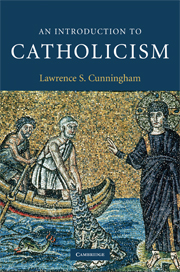Book contents
- Frontmatter
- Contents
- Illustrations
- Preface
- Acknowledgments
- 1 The many meanings of Catholicism
- 2 Roman Catholicism
- 3 Being Catholic: Some typologies
- 4 Catholicism in place and time
- 5 Catholic worship
- 6 The rule of faith
- 7 Catholic spirituality
- 8 The missionary character of Catholicism
- 9 Catholic reformation(s)
- 10 The moral life
- 11 The contemporary Catholic Church
- 12 Reading Catholicism: Bibliographical resources
- Index
- References
1 - The many meanings of Catholicism
Published online by Cambridge University Press: 05 June 2012
- Frontmatter
- Contents
- Illustrations
- Preface
- Acknowledgments
- 1 The many meanings of Catholicism
- 2 Roman Catholicism
- 3 Being Catholic: Some typologies
- 4 Catholicism in place and time
- 5 Catholic worship
- 6 The rule of faith
- 7 Catholic spirituality
- 8 The missionary character of Catholicism
- 9 Catholic reformation(s)
- 10 The moral life
- 11 The contemporary Catholic Church
- 12 Reading Catholicism: Bibliographical resources
- Index
- References
Summary
INTRODUCTION
It is common for many people to understand the word “Catholicism” to mean a particular denomination as distinguished, say, from Protestantism or Orthodoxy, within the larger world of Christianity. Thus, for example, Catholics say the rosary, revere the pope, go to mass on Sunday, and have a clergy that does not marry, and those characteristics, among many other things, distinguish Catholics from Protestants. Catholics are also said to reflect certain ethnic backgrounds: The Irish are Catholics but the Scots are Presbyterian; Italians are Catholics but Norwegians are Lutheran. In some places, Catholics are identified by class. In the USA a century ago, Catholics were considered mainly but not exclusively working class while some mainline Protestants were identified with the managerial class. In England, until very recently, that was also the case. These and similar stereotypes are very much a part of the popular culture, but they are stereotypes nonetheless. People are divided by denominational difference, and they frequently understand themselves through their inherited religious upbringing: To be Irish is to be Catholic. This popular conception of Catholicism, understood as a sociological category, is true of most large religious traditions. To belong to any or other religious tradition depends very much on where one lives and how one perceives oneself relative to the larger culture.
In that general sense, then, Catholicism can be considered as one Christian denomination among many but identifiable as having its own distinct culture, character, and sometimes dependent on ancestry and geographical location.
- Type
- Chapter
- Information
- An Introduction to Catholicism , pp. 1 - 22Publisher: Cambridge University PressPrint publication year: 2009



